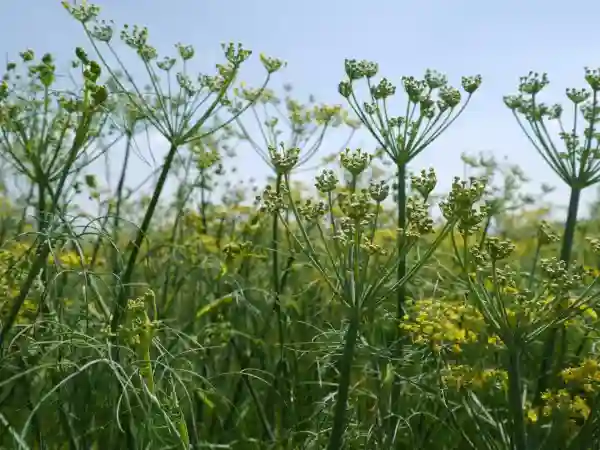

The health benefits of Fennel
Fennel’s combination of delicious uplifting flavours has made it one of Pukka’s favourite herbs. We love it so much, it can be found in 18 of our delicious herbal teas and organic supplements. This year at Pukka, we will use 35,000kg sweet fennel and 10,000kg bitter fennel seed grown on 72 acres of organic farm land.
The Sanskrit name for fennel is ‘Shatapushpa’ which means ‘one hundred flowers’, describing fennel’s distinctively beautiful tiny umbels of vibrant yellow flowers. All members of the Apiaceae family, commonly known as the carrot or parsley family, are large and aromatic and display their small flowers in distinctive ascendant umbels, similar to those of cow parsley. Fennel grows up to 2.5m tall and has large, beautiful, aniseed-scented feathery leaves.
Little bit of chemistry…
The primary constituent in fennel is known as anethole. It is this component that gives fennel its characteristic taste and smell, often likened to that of anise and camphor.
Anethole is a potent anti-microbial against bacteria, yeasts and fungi. It is also an effective anthelmintic and modulates the tumour necrosis factor.
In addition to anethole, fennel contains 12 major phenolic compounds and a high level of flavonoids. Phenolic compounds often display strong free radical scavenging activity. Flavonoids characteristically encourages a healthy inflammation response.
Constituent
Phenolics = 30-40% approx
Flavonoids = 15%
Essential Oils, including Anethole = 2-6%
A Bitter Sweet Tale
Depending on the country of origin and the latitude where it is grown, fennel plants produce seeds with extremely varied essential oil content and essential oil composition. It is the essential oil content that determines the sweetness and bitterness detected in the taste of the plant.
Fennel is cultivated on a huge scale in many parts of the world. Fennel grown in Turkey has the highest essential oil content with more than 85% anethole. This gives the plant a particularly sweet taste and is now where all of Pukka’s sweet fennel is sourced from. Our bitter fennel is grown further north in Bulgaria and Hungary.
In our Three Fennel tea we combine the seeds of bitter fennel (Foeniculum vulgare var. vulgare) and sweet fennel (Foeniculum vulgare var. dulce) with a small amount of sweet fennel leaf to create a delicate balance of sweet, pungent and bitter flavours.
The figures below displays the vast differences in essential oil content, specifically anethole, across three different global locations:
Essential oil %
European Pharmacopeia standards = 2%
Turkish Fennel = 2.7%
Egyptian Fennel = 2.1%
Indian Fennel = 1.3%
Anethhole (% of EO)
European Pharmacopeia standards = minimum 80%
Turkish Fennel = 85%
Egyptian Fennel = 0.9%
Indian Fennel = 73.4%
Interesting Facts and Figures:
Many people associate fennel with the bulbous base of the plant that is cooked as a vegetable. This is a modified variety that has been created through years of careful selection and breeding. Known as Florence fennel (or Foeniculum vulgare var. azoricum), this variety is much shorter than the sweet and bitter varieties that we use at Pukka.
Cultivation Methods
Pukka is all about supporting and loving the natural world; our organic farming methods encourage 50% more wildlife to thrive in comparison to conventional farms. Especially so with fennel; it is grown in stunning fields brimming with bio-diversity. In the first year the farmers allow weeds and wild flowers to grow alongside the young fennel plants; this helps to attract wide variety of animals and beneficial insects. When the crop is harvested the farmers start in the middle and work outwards so that the wildlife have an opportunity to move into surrounding fields.
Fennel is a perennial plant that is often grown as an annual. In warm climates, fennel plantations can remain in the same plot for up to 10 years, although the average productive life is around 6 years.
Our organic farmers in Turkey grow sweet fennel as an annual crop, sowing the seed in spring and harvesting it towards the end of the summer. Bitter fennel is grown as a perennial crop and drones are used to monitor and manage weeds.
